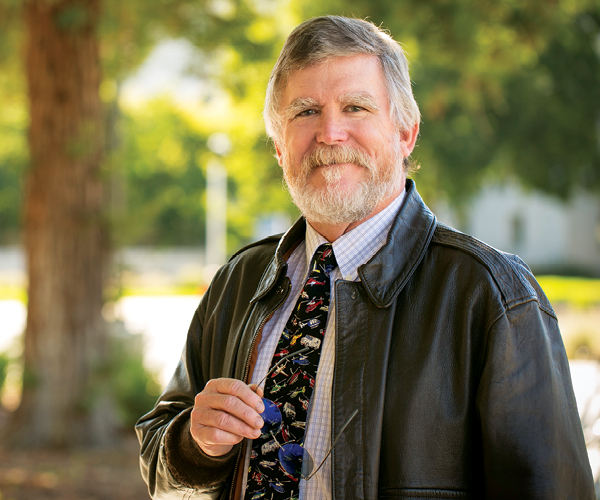
Flying high
Former flight nurse imparts learning to students
A necktie and a leather bomber jacket.
It is apt attire for Gordon Worley, an assistant clinical professor in the family nurse practitioner and physician assistant programs at the Betty Irene Moore School of Nursing at UC Davis. Worley spent 10 years flying in helicopters to provide medical assistance to people in extreme emergencies.
“Some people call it being an adrenaline junkie. I’m not sure that’s the case,” says Worley, who has a part-time appointment in the emergency department at Sutter Amador Hospital. “But I do admit to enjoying situations that are probably a little beyond what a lot of other people do.”
Worley started his nursing career in 1984, working in emergency departments as a staff nurse, manager, disaster coordinator and a flight nurse on a helicopter medical response team. As a flight nurse, Worley went on hundreds of missions — often to remote locations during inclement weather — to help people who were suffering with everything from a heart attack to getting stuck in a grain silo.
“When you are going into an emergency scenario, you always have to be on the top of your game,” he says. “It requires you to focus, draw on things you’ve learned over the years and do what has to be done. You never knew what you were going to get, and that’s exciting.”
Worley eventually stopped flying because of the risk. At the time Worley was a flight nurse, a helicopter emergency medical service crew member had a 1-in-50 chance of suffering a fatal accident.
He went back to the emergency department and, through his work and volunteerism, continued to advance his career in wilderness medicine, rural health, humanitarian and disaster response, emergency medical services, air medical transport, and search and rescue.
Worley says his current position at the School of Nursing is the perfect culmination of his career because the school’s new facility, Betty Irene Moore Hall, coupled with an innovative approach to learning, allows him to impart lessons about the importance of creative problem- solving with his students.
“From flying in the helicopter, to emergency health, to wilderness medicine and rural medicine,” he says, “I can pull it all together for this position and pass it on to the next generation to help make sure they are brought up right.”

